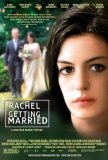Rachel Getting Married (United States, 2008)

Filmmakers love weddings. The reasons are obvious: so many characters, so much potential for drama and romance, so many things that can go wrong. Weddings are also events that most people, in one way or another (whether as a guest or a participant) can identify with. Rachel Getting Married, Jonathan Demme's contribution to this field, uses a wedding and its attendant chaos as the backdrop for a character-based story about a young woman struggling to remain clean after emerging from rehab. Told in a simple, spare style that imitates Lars von Trier's Dogma initiative, Rachel Getting Married is anything but simple in the way it explores the complexities and contradictions of the lead character. At times, the movie gets bogged down in minutia but the emotions evoked and captured are as honest and brutal as one is likely to find on film.
Kym (Anne Hathaway) has arrived home from rehab on the day before the wedding of her older sister, Rachel (Rosemarie DeWitt). A junkie since her teens, Kym has been clean for nine months, but her sobriety has not altered her basic personality. Kym is flamboyant and self-centered, but there is a deep core of pain and guilt within her that no amount of bluster and bravado can entirely conceal. Her overprotective father (Bill Irwin) hovers around her like a mother hen. She causes a scene when she learns that Rachel has chosen her best friend, Emma (Anisa George), to be the maid of honor. And she looks forward to the rehearsal dinner so she can be reunited with her superficial mother (Debra Winger).
The wedding might be all about Rachel, but the movie is all about Kym. She is a complicated, volatile individual with obvious bipolar tendencies. Her instability provides a source of dramatic tension, but it never feels forced or artificial. Gradually, Jenny Lumet's screenplay unveils the source of Kym's pain, and a stinging confrontation with her mother brings it all home. By the end of the movie, the viewer may not like her (she can be mean, spiteful, and self-absorbed - not exactly likeable qualities), but understanding comes with this kind of candid, unexpurgated examination. As a bonus, the storyline does not veer into the overused cliché one often expects from a film centered upon a recovering addict.
Her performance as Kym is the kind of work that forces a re-assessment of the actress' abilities and range. After beginning her career trapped in the pretty, shallow, wholesome image of a live-action Disney heroine, Hathaway intentionally spurned her G-rated following by appearing topless in the direct-to-video 2005 feature, Havoc. Since then, she has gravitated toward more mature fare (excepting this year's Get Smart), but Rachel Getting Married is the first film where she gives a complete, adult performance. She gets the character and runs with it. She effectively captures Kym's highs and lows, the claustrophobic feel of coming home and needing isolation in a house full of strangers, the desperate need for forgiveness and catharsis, and the realization that neither may be forthcoming. At times, I was reminded of Maggie Gyllenhaal in Sherrybaby, although this film is less raw and more hopeful.
Jonathan Demme has elected to produce Rachel Getting Married using minimalist techniques. The cameras are, for the most part, hand-held and many of the shots are lengthy. The lighting is all natural and there is no incidental music. At times, it feels like a home-made video of a wedding and its preparations. The film occasionally dwells on little things, like a five-minute tug-of-war between Rachel's father and fiancé about who is more adept at loading a dishwasher. The goal of including all of these seemingly irrelevant details is to anchor the film's reality, but there are times when there's a little too much of this and it threatens to distract viewers from the central drama. It's a stylistic choice on Demme's part. While heightening the movie's authenticity, it tends to make it feel longer than it is.
Movies about weddings tend to highlight quirky characters and resort to facile resolutions. Neither flaw is evident here. The participants are real and the unanswered questions echo what life often provides. Rachel Getting Married is not a happy movie, but neither does it wallow in unrelieved bleakness. There's an element of hope in the ending and there are moments of understated humor sprinkled throughout. For those who enjoy character studies that explore the nature of pain and guilt, this is a solid drama.
Rachel Getting Married (United States, 2008)
Cast: Anne Hathaway, Rosemarie DeWitt, Mather Zickel, Bill Irwin, Anna Deavere Smith, Anisa George, Tunde Adebimpe, Debra Winger
Screenplay: Jenny Lumet
Cinematography: Declan Quinn
Music:
U.S. Distributor: Sony Classics
U.S. Release Date: 2008-10-03
MPAA Rating: "R" (Sexual Situations, Profanity)
Genre: DRAMA
Subtitles: none
Theatrical Aspect Ratio: 1.85:1
- Kill the Messenger (2014)
- (There are no more better movies of Rosemarie DeWitt)
- (There are no more better movies of Mather Zickel)
- (There are no more worst movies of Mather Zickel)

Comments